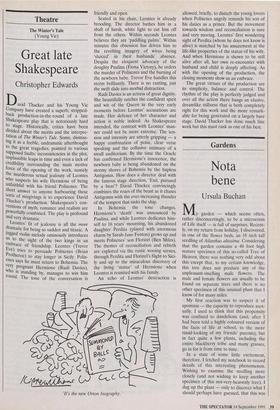Theatre
The Winter's Tale (Young Vic)
Great late Shakespeare
Christopher Edwards
avid Thacker and his Young Vic Company have created a superb, stripped- back production-in-the-round of a late Shakespeare play that is notoriously hard to stage. Historically, critics have been divided about the merits and the interpre- tation of The Winter's Tale. Some, dismiss- ing it as a feeble, undramatic afterthought to the great tragedies, pointed to various supposed faults: inconsistencies in the plot, implausible leaps in time and even a lack of credibility surrounding the main motive force of the opening of the work, namely the murderous sexual jealousy of Leontes who suspects his wife Hermione of being unfaithful with his friend Polixenes. The short answer to anyone harbouring these sorts of misgivings is to experience David Thacker's production. Shakespeare's con- ventions of myth, romance and realism are Powerfully combined. The play is profound and very dramatic. Leontes' fit of jealousy is all the more dramatic for being so sudden and titanic. A Jagged violin melody ominously introduces us to the sight of the two kings in an embrace of friendship. Leontes (Trevor Eve) tries to persuade Polixenes (Brian Protheroe) to stay longer in Sicily. Polix- enes says he must return to Bohemia. The very pregnant Hermione (Rudi Davies), i who is standing by, manages to win him round. The tone of the conversation is
friendly and open.
Seated in his chair, Leontes is already brooding. The director bathes him in a shaft of harsh, white light to cut him off from the others. Within seconds Leontes believes they are 'paddling palms'. Within minutes this obsession has driven him to the revolting imagery of wives being 'sluiced' in their husbands' absence. Despite the eloquent advocacy of the doughty Paulina (Fiona Victory), he orders the murder of Polixenes and the burning of the newborn babe. Trevor Eve handles this storm brilliantly. There is no ranting, just the swift slide into morbid distraction.
Rudi Davies is an actress of great dignity. She beautifully catches the confident spirit and wit of the Queen in the very early moments before Leontes' accusations are made. Her defence of her character and action is noble indeed. As Shakespeare intended, the contrast with Leontes' man- ner could not be more extreme. The ten- sion and intensity are utterly gripping — a happy combination of poise, clear verse speaking and the collusive intimacy of a small auditorium. By the time the Oracle has confirmed Hermione's innocence, the newborn baby is being abandoned on the stormy shores of Bohemia by the hapless Antigonus. How does a director deal with the famous stage direction, 'Exit, pursued by a bear'? David Thacker convincingly combines the roars of the beast as it chases Antigonus with the ever-increasing thunder of the tempest that sinks the ship.
In Bohemia the tone changes. Hermione's 'death' was announced by Paulina, and while Leontes dedicates him- self to 16 years' mourning, his abandoned daughter Perdita (played with enormous charm by Sarah-Jane Fenton) grows up and meets Polixenes' son Florizel (Ben Miles). The themes of reconciliation and rebirth are explored via the rustic wooing scenes, through Perdita and Florizel's flight to Sici- ly and up to the miraculous discovery of the living 'statue' of Hermione when Leontes is reunited with his family.
An echo of Leontes' destruction is allowed, briefly, to disturb the young lovers when Polixenes angrily reminds his son of his duties as a prince. But the movement towards wisdom and reconciliation is sure and very moving. Leontes' first wondering sight of Perdita (whom he does not know is alive) is matched by his amazement at the life-like properties of the statue of his wife. And when Hermione is shown to be still alive after all, her own re-encounter with husband and child is deeply affecting. As with the opening of the production, the closing moments show us an embrace.
The great virtues of the production are its simplicity, balance and control. The rhythm of the play is perfectly judged and over all the action there hangs an elusive, dreamlike stillness that is both completely right for this work and the more remark- able for being generated on a largely bare stage. David Thacker has done much fine work but this must rank as one of his best.


















































 Previous page
Previous page